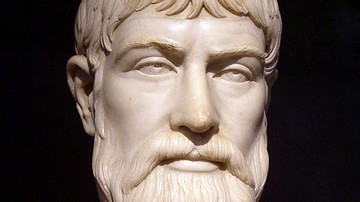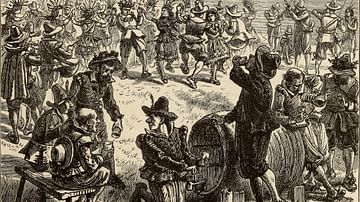Search Definitions
Browse Content (p. 113)

Definition
Robert II of Scotland
Robert II of Scotland ruled as king from 1371 to 1390. Born Robert Stewart, he succeeded the heirless David II of Scotland (r. 1329-1371) and so founded the royal house of Stewart. Dividing Scottish estates between his many offspring, Robert...

Definition
Tartarus
In Greek mythology, Tartarus was the lowest point of the universe, below the underworld but separate from it. Tartarus is best known from Hesiod's Theogony as one of the first beings to come into existence in the universe and also as the...

Definition
Pindar
Pindar (c. 518 to c. 448/7 BCE) was an ancient Greek lyric poet, probably the greatest of his time. His works have been divided into 17 books of different types of poetry, but only those containing 44 choral victory songs composed for the...

Definition
Jesus Christ
Jesus Christ is the designation of Jesus of Nazareth (d. c. 30 CE), who was an itinerant Jewish prophet from the Galilee in northern Israel. He preached the imminent intervention in human affairs by the God of the Jews, when God would establish...

Definition
David II of Scotland
David II of Scotland ruled as king from 1329 to 1371 CE. Succeeding his father Robert the Bruce (r. 1306-1329 CE) when still a child, his early reign was threatened by the pretender Edward Balliol (c. 1283-1364 CE), son of King John Balliol...

Definition
Chitrali Mythology
Chitrali mythology developed in the region of Chitral, the tallest portions of the Hindu Kush mountains, where the Chitrali people, at the juncture of South, Central, West, and East Asia, were exposed to many external cultural influences...

Definition
Robert the Bruce
Robert I of Scotland, better known as Robert the Bruce, reigned as King of Scotland from 1306 to 1329 CE. For his role in achieving independence from England, Robert the Bruce has long been regarded as a national hero and one of Scotland's...

Definition
Merrymount Colony
Merrymount Colony (1624-1630 CE) was a settlement first established in New England as Mount Wollaston in 1624 CE but renamed Mount Ma-re (referred to as Merrymount) in 1626 CE by the lawyer, writer, and colonist Thomas Morton (l. c. 1579-1647...

Definition
John Balliol
John Balliol ruled as the king of Scotland from 1292 to 1296 CE. He was supported by Edward I of England (r. 1272-1307 CE) in the competition to find the successor to the heirless Alexander III of Scotland (r. 1249-1286 CE), a process known...

Definition
Diodorus Siculus
Diodorus Siculus or Diodorus of Sicily (active 1st century BCE) was a Greek historian, known for his universal history Bibliotheca Historica. Originally, it was a 40-volume monumental work, covering the history of the Mediterranean region...